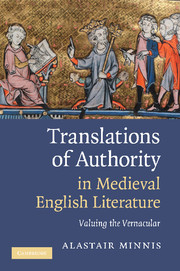Book contents
- Frontmatter
- Contents
- Preface
- List of abbreviations
- Introduction: valuing the vernacular
- Chapter 1 Absent glosses: the trouble with Middle English hermeneutics
- Chapter 2 Looking for a sign: the quest for Nominalism in Ricardian poetry
- Chapter 3 Piers's protean pardon: Langland on the letter and spirit of indulgences
- Chapter 4 Making bodies: confection and conception in Walter Brut's vernacular theology
- Chapter 5 Spiritualizing marriage: Margery Kempe's allegories of female authority
- Chapter 6 Chaucer and the relics of vernacular religion
- Notes
- Bibliography
- Index
Chapter 6 - Chaucer and the relics of vernacular religion
Published online by Cambridge University Press: 30 June 2009
- Frontmatter
- Contents
- Preface
- List of abbreviations
- Introduction: valuing the vernacular
- Chapter 1 Absent glosses: the trouble with Middle English hermeneutics
- Chapter 2 Looking for a sign: the quest for Nominalism in Ricardian poetry
- Chapter 3 Piers's protean pardon: Langland on the letter and spirit of indulgences
- Chapter 4 Making bodies: confection and conception in Walter Brut's vernacular theology
- Chapter 5 Spiritualizing marriage: Margery Kempe's allegories of female authority
- Chapter 6 Chaucer and the relics of vernacular religion
- Notes
- Bibliography
- Index
Summary
Having asked Harry Bailly to ‘com forth’ and be the first to ‘kisse’ his spurious ‘relikes everychon’, the Pardoner suffers what is probably the most robust put-down in the entire Canterbury Tales.
‘Nay, nay!’ quod he [i.e. Bailly], 'thanne have I cristes curs!
Lat be', quod he, 'it shal nat be, so theech!
Thou woldest make me kisse thyn olde breech,
And swere it were a relyk of a seint,
Though it were with thy fundament depeint!
But, by the croys which that Seint Eleyne fond,
I wolde I hadde thy coillons in myn hond
In stide of relikes or of seintuarie.
Lat kutte hem of, I wol thee helpe hem carie;
They shal be shryned in an hogges toord!’
(vi (c), 946–50)This passage has been the subject of substantial exegesis recently, particularly by those who wish to claim that the Pardoner's alleged homosexuality does indeed matter. Monica McAlpine, whose 1980 article on that subject set the course of much subsequent criticism, saw it as the result of the Pardoner's assault on ‘Harry's heterosexual sensibilities’. Following up on this initial outing of the Host as a homophobe, Steven Kruger argued that at this point he ‘could not stand farther from Christian spirituality’. That is to say, Harry ‘is drawn strongly away from the spiritual’ as he ‘fully involves himself in the debased physical world presented by the Pardoner as his own’.
- Type
- Chapter
- Information
- Translations of Authority in Medieval English LiteratureValuing the Vernacular, pp. 130 - 162Publisher: Cambridge University PressPrint publication year: 2009



